A Stanford running back broke Barry Sanders' NCAA record for all-purpose yards in a season.
But it was not Barry's son, who was a Cardinal running back for four years. Instead it was Christian McCaffrey, the son of another NFL star.
"It's very ironic," Barry J. Sanders said.
It's also the major reason Sanders, a talented 21-year-old, is transferring from Stanford. McCaffrey, who accumulated 3,864 total yards and finished second in the Heisman Trophy voting as a sophomore, effectively blocked Sanders from receiving playing time and attracting the requisite NFL attention.
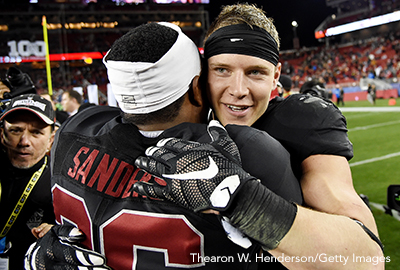
As a result, Sanders, who will graduate from Stanford with a communications degree in June, will play college football at Oklahoma State next season as a graduate transfer student.
OSU is where his father starred from 1986 to 1988 as a Heisman Trophy-winning back. Barry J. Sanders will be coached by Mike Gundy, the starting quarterback who handed off to his dad.
Sanders' decision, which he announced Feb. 11, adds another layer to the narrative. He initially chose Stanford -- in part -- to escape dad's shadow. Now he's going back to his dad's alma mater because Stanford has a runner who broke his father's records.
Sanders, however, harbors no ill will toward McCaffrey for indirectly forcing him to move from Palo Alto. He called him "a good dude" and noted that he helped recruit McCaffrey to Stanford, though he joked that he didn’t need much convincing, considering his parents -- soccer star Lisa and former Broncos wide receiver Ed McCaffrey -- both attended Stanford.
"I've known him long before he got here," Sanders said. "He's an exceptional player, definitely a playmaker ... a good teammate."
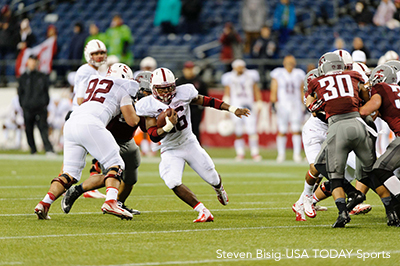
Along with Stanford, Oklahoma State was one of Sanders' original finalists after he graduated from Heritage Hall High in Oklahoma. The others were Alabama, Florida State and UCLA.
Alabama coach Nick Saban went after him so hard that he was investigated for two alleged recruiting violations while pursuing him.
En route to Dallas for a coaches' convention during Sanders' junior year, Saban stopped by Heritage Hall. (Anything more than a basic greeting with a player, who is still a junior, is a violation, though it turns out he only asked Sanders about his foot injury while shaking his hand.)
Then when visiting Alabama, Sanders sat with Saban at an Alabama-Arkansas basketball game, and they were shown on the video board while fans chanted for Barry. (The NCAA doesn't allow colleges to introduce a visiting prospect at an event attended by media or one that's open to the general public.)
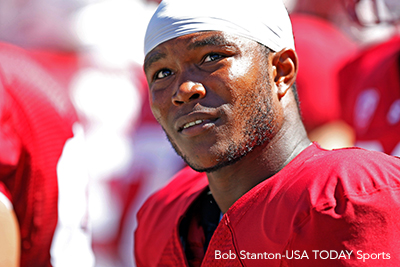
Sanders ultimately decided to play for David Shaw at Stanford.
The choice of Stanford, which he declared at the U.S. Army All-American Bowl, was appealing in part because the son of the Hall of Fame back could become his own man. Famous athletes in the past -- like John McEnroe, Janet Evans, Tiger Woods and Andrew Luck, among others -- stood out less and could lead more regular lives at a school replete with high-achievers.
And Sanders was recruited heavily by Stanford because of his talent, not his name.
Rivals.com ranked him as the eighth best running back in the nation, and during his four years at Heritage Hall, he rushed 403 times for 3,825 yards and 55 touchdowns.
After redshirting his freshman year at Stanford, the 5-10, 198-pound Sanders rushed 115 times for 672 yards, including 51 attempts for 315 yards this past season, and five touchdowns. He averaged an impressive 5.84 yards per carry during his Cardinal career.
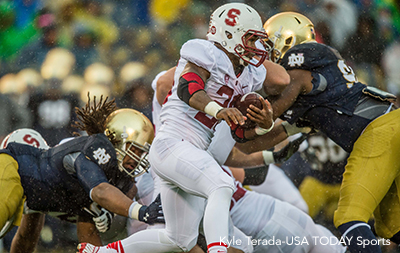
Also a gifted returner, Sanders possesses some of the same skills as his father like exceptional field vision and precise cuts, though he runs more upright. His biggest area needing improvement at Stanford involved his pass blocking.
Sanders said he enjoyed his time at Stanford and always will root for the Cardinal.
"Yeah, I wouldn't change anything," he said. "(Stanford) has a special place in my heart."
A couple of days after Stanford's blowout victory against Iowa in the Rose Bowl, Sanders spoke to Shaw on the phone. The coach praised his effort and understood why he wanted to look at other programs, telling him he "definitely deserved to have an opportunity."
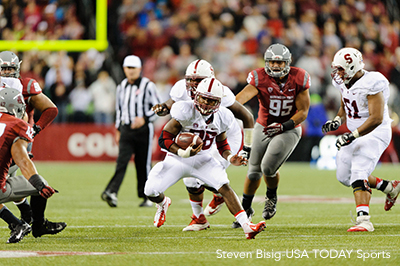
Shaw declined further comment through a school spokesman.
When Barry J. Sanders spoke to his father, who has a different middle name than his son, about transferring, the former Lions star just emphasized being the best player he could be.
"He definitely was very understanding," Barry J. said. "He didn't have a whole lot to say except just keep working. At some point the NFL scouts -- and who is important -- will see my talent, and so I just have to keep making plays."
The former Oklahoma State star also did not push him to join the Cowboys program. If anything, he was the one who suggested looking at more options and keeping an open mind.
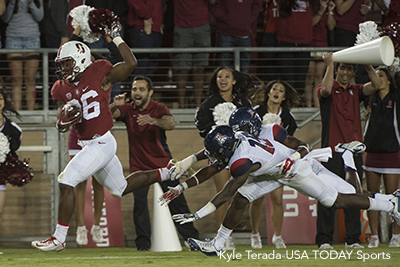
Sanders always has been a supportive father but more distant toward football. Asked what he taught his son about football while he grew up, Sanders emphasized that hanging out with good peers and continuing to avoid negative influences was far more important.
"I can't think of anything I've given him advice on as far as (playing) ball," the elder Sanders said. "There's going to be a lot of advice he's going to need, and probably the thing that he’ll need the least help with will be football … The football part of it -- even though it’s not easy -- is a heck of a lot easier than a lot of this other stuff that us parents have to guide our kids on."
Upbeat and often sporting a grin, Barry J. is more jovial than his notably media-shy father. He disarmingly chuckles between a reporter's questions, and during high school, his coach had to reprimand him for smiling after he fumbled during practice.
"I try to laugh as much as possible," he said. "I've gotten my more talkative, outgoing side from mom's side."
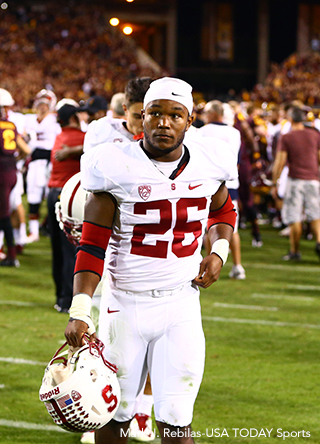
But after earning his graduate degree, he hopes to play in the NFL like his dad.
"That's the goal we're working towards," he said.
He also looked up to NFL running back Clinton Portis and wore No. 26 because of him -- instead of the No. 20 his father wore with the Lions and the No. 21 he wore with OSU.
When the elder Sanders sported that jersey at Oklahoma State, playing time was blocked his first two years by future Hall of Famer Thurman Thomas. After the Bills drafted Thomas to the NFL, Sanders rushed for 2,628 yards in 1988.
After similarly playing behind an All-American back, his son's time is coming soon.
-- Follow Jeff Fedotin on Twitter @JFedotin.





